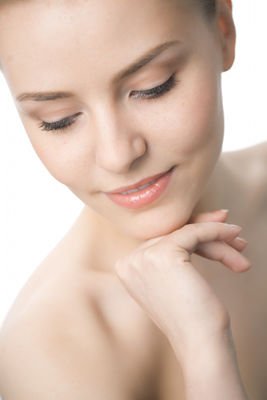 It is the time of a natural appearance. Great surgical gestures are used less and less. We are seeking a healthy, spontaneous younger look. For this reason there is a greater demand for treatments that improve the skin’s quality and appearance without altering expression and without recuperation period, requiring only maintenance treatments every 6 months.
It is the time of a natural appearance. Great surgical gestures are used less and less. We are seeking a healthy, spontaneous younger look. For this reason there is a greater demand for treatments that improve the skin’s quality and appearance without altering expression and without recuperation period, requiring only maintenance treatments every 6 months.
The skin’s general appearance in the ageing process is related mainly to quantitative aspects of sunlight. However, it is also affected by other factors: genetic, hormonal (such as menopause), inadequate nutrition, toxic substances (such as alcohol or tobacco) and age.
Clinically speaking, skin ageing is characterized by skin that appears rough, with enlarged pores, pigmentation and vascular changes and a decrease in the amount and function of collagen and elastin fibres. Constant contractions of certain muscles leave wrinkles in certain facial areas.
In the last few years there has been an increase in the demand for a new generation of treatments that produce substantial improvement of visible ageing signs. These treatments, called “lunchtime treatments”, are also characterized by low risk of complication, no need of anaesthesia, and, most importantly, no convalescence period, allowing the patient to resume his/her daily routine after the procedure. They are the current trend due to the natural results they obtain and the fresh, glowing effect they have on the patient’s skin.
The ideal approach for our patients is the combination of the following techniques:
Another widely accepted technique is facial mesotherapy with hyaluronic acid. Hyaluronic acid is the skin component responsible for tissue compactibility. It enables the three-dimensional organization of the extra cellular matrix components and can store a great amount of water around itself, allowing it to maintain the necessary hydration of the skin and subsequent turgidity that is so representative of youth.
Hyaluronic acid also recreates an optimal physiological environment for the proliferation and migration of fibroblasts and for the neosynthesis of collagen and other components of the extra cellular matrix. Not only does hyaluronic acid offer a hydrating and restructuring effect, but it is also effective in the protection of fibroblasts from the cytotoxic action of free radicals.
As time goes by, the skin’s hyaluronic acid gradually decreases, resulting in a less smooth and luminous appearance. Mesotherapy consists in infiltrating natural, highly purified hyaluronic acid that is identical to the natural polymer with a fine needle into the dermis of the face, neck and cleavage.
Before performing the infiltrations a Cold-Pack is applied to the area to minimize discomfort. The result is not immediate given that the product will be distributed homogeneously and gradually and inversely broken down by our body’s natural process, requiring the planning of maintenance sessions.
The number of sessions will depend on the skin’s condition and response to treatment but usually 2-3 treatment sessions every 3-4 weeks are programmed, after which there are usually maintenance sessions every three months.
A sensibility test is not required and is contraindicated in infected or inflamed skin areas. Secondary effects are local at the point of injection: erythema, discoloration, inflammation, echymosis. We cannot discard the possibility that granuloma may form due to the foreign body.
As a final note, we can say the technique is safe, fast and restores the skin with hydration, luminosity and smoothness. It can be combined with other rejuvenation techniques.
Finally, we have facial rejuvenation systems that use intense pulsed light (IPL). IPL systems are polychromatic, non-coherent light systems that emit in the 515-1200nm visible light spectrum (yellow, red and infrared). Polychromatic light destroys the vascular/pigmented lesion without harming surrounding structures (selective photothermolysis theory) and stimulates skin reshaping. It acts on three basic skin components: dermal collagen and extra cellular substance, dermal ecstatic and dilated vessels and irregular skin pigmentation.
The number of sessions depends on the skin’s condition, but 5 or 6 are usually enough. Intervals between treatments also vary but are usually 3 or 4 weeks. The procedure is not indicated in patients who are taking photosensitizing agents or who have taken Roacutan in the last few months, in pregnancy, breastfeeding, suspicious pigmented lesion or possible skin cancer. Treatment is also contraindicated in suntanned skin or in patients who plan to suntan during the course of treatment.
The procedure is very simple and does not require anaesthesia. The patient lies down and a layer of very cold gel is applied on the area to be treated. The patient’s eyes must be protected from the light. The session lasts about 20 minutes and the patient can resume his/her daily activities immediately. The skin usually presents diffused oedema and erythema that lasts a few hours (12-48). It is common for microscabs to form on the treated areas that present epidermal pigment alterations (lentigos, ephelides) but they usually disappear within 2 or 3 days. Sometimes mild or purple (purpura) vesiculous lesions appear but last only a few days. Make-up can be used starting on the first day of treatment.
IPL produces selective causes selective damage in the dermis, damaging old or aged collagen that has lost its structure. This damage prompts an inflammatory response with subsequent tissue repair and replenishment of collage , which leads to an improvement in the wrinkle appearance, close of the pores, luminosity and improvement of skin texture. IPL also breaks melanin into fragments making the skin homogenous and improving the vascular component. Nonetheless, we have other systems that do not change luminosity, pore or texture but which are specific to treat facial vascular components: Candela laser, pulsed dye laser, or laser for pigmented lesions or Alex laser.
Treatments at IML are personalised according to each patient's characteristics. You can request an informative consultation with one of our medical experts.